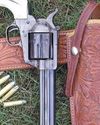CATEGORIES

Spring Fever
This winter was one of Idaho’s worst in history, with deep snow and temperatures that plummeted below zero for extended periods. As this is written, days are getting longer, most of the snow is gone, and spring fever, which seems especially bad this year due to the long, harsh winter, is setting in. As soon as current Handloader deadlines are met, my son Porter and I will be saddling the horses and riding the mountain as “medicine” to cure our spring fever, to relax and enjoy the horses and natural beauty of the grasslands. We also check cattle, shoot sixguns and hunt up a little adventure when possible.

Sierra Bullets
Accurate and Field Proven Since 1947

7mm Remington Magnum
Handloaders always welcome new powders in their endless effort to improve the velocity and accuracy of their loads. So in anticipation of stepping up the performance of my 7mm Remington Magnum, new powders have been tested, including Alliant Reloder 17, 23 and 33; and IMR-4451, -4955 and -7977. Most of these powders worked well with a range of 7mm bullet weights, while one was limited to a single weight bullet.

Lyman Deluxe Carbide Expander/Decap Die Rod
Years ago Lyman Products decided to take a fresh look at the whole sizing / decapping business. Reasoning that the tungsten carbide inserts used in some straight-walled handgun die sets are so hard and slick that cases need not be lubricated before sizing, a tungsten carbide expander button would certainly facilitate pulling it through the case neck after the initial sizing. The result would be less potential case stretching and an overall smoother operation.

Colt Lightning .38-40 Winchester
BULLETS & BRASS

Loading Oddball Rifle Cartridges
A Sauer drilling came with 6.5x57R dies and ammunition, so it was relatively easy to work up handloads using 6.5x55 data. Rimmed versions of European cartridges designed for use in break-action guns use the same dies as the rimless versions but a different shellholder.

The .38 Caliber
Most American .38 cartridges can be traced to Colt’s Belt Pistol, a .36-caliber percussion revolver that collectors commonly call the Model 1851 Navy. How did .36 get translated to .38? In those days, firearms manufacturers were fond of designating caliber by a barrel’s land diameter instead of its groove diameter. Nominal groove diameter for a .36 “Navy” was .375 inch.

Loads From The Intrepid Years
IN RANGE

man-stopper redux
loads for the .32 s&w long and .44 special

The Heavyweight .358 Norma
On June 26, 1959, Sweden’s Ingemar Johansson demolished Floyd Patterson in the third round of their first heavyweight title fight in New York. Johansson’s main weapon – in fact, his only one – was a devastating right hand that boxing writers called the “Hammer of Thor.”

.243 Winchester
New Powders and Bullets for the Most Popular 6mm.

Duplicating Factory Ammunition
Sometimes the reward is worth the work.

H-S Precision Sporter Light Rifle
Wringing Out a Semi-Custom.308 Winchester

Hawkeye Borescope
Seeing is Understand

.25-06 Ackley Improved
.25-06 Ackley Improved

Runge Prime Catcher
Runge Prime Catcher

Power Case Trimming
Tools that work and Save Time

Cartridge Board
The early years of the 3-inch 20 gauge were discussed in the last issue. These lasted until World War II, at which time the cartridge should have disappeared, because it had been no more than a fad among a bunch of wealthy duck hunters. All the stories about it producing large bags and amazing long-range shots were just that, stories, and an example of the fact that scatter gunners tend to remember the hits while forgetting the misses. Indeed, the 3-inch 20 gauge is not, nor can it ever be, anything but a common 16 gauge that is maybe a bit slimmer and a few ounces lighter. It takes these advantages back, however, in recoil when the trigger is pulled on a cartridge containing a shot charge equal to that of the 16 gauge.

Irreplaceable Gun Stores
As I have written in these pages several times, I was born and raised in Mingo County, West Virginia, the location of the Hatfield/McCoy Feud of the late 1800s and the Coal Mine/Union Wars of the early 1900s. (My great-great grandmother was Suzanna Hatfield.) In 1968, the nearest college was Marshall University in Huntington, where in November 1970, a plane crash wiped out the football team and coaching staff. The 2007 movie We Are Marshall was based on that tragedy. (Yes, I was a student there at the time.)

Annealing Rifle Brass
The primary reason for annealing rifle brass is to prevent case necks from cracking – and they will, eventually, because firing and resizing cases “work hardens” brass, making the thin necks brittle. Most rifle cases will survive four or five firings, and some will last longer, depending on the brand and method of resizing. Many handloaders avoid the issue entirely by retiring brass after several firings.

Missteps in Cartridge Design
No one would deny that the 6.5 Creedmoor, designed by Hornady, with rifles initially made by Ruger, is not one of the great combinations to come down the pike in recent years. No one can predict the future, but barring some cataclysm, it seems destined to become as much a fixture on the shooting scene as the .270 Winchester.

IMR Target
PROPELLANT PROFILES

Starline Brass
FROM THE HIP

Colt SAA .38-40/.38 WCF
MIKE’S SHOOTIN’ SHACK

.277 Wolverine
WILDCAT CARTRIDGES

P.O. Ackley's Big .450
Still Good After All These Years

.223 Remington
Loading for Accuracy, Efficiency and Versatility

The .455 Webley Labyrinth
Mk. II Loads for a Classic Revolver.

The Original .338 Winchester
Loads for an 1886 .33 WCF.

Unique
The Universal Powder.